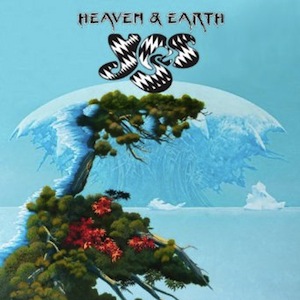I can’t say Heaven & Earth is a terrible record. I can’t say too much about it all, because I keep falling asleep around six minutes into the opening track.
Well, that’s not quite true. And does every record need to kick the listener in the head, aurally? No, quite the contrary. I’ll happily admit to having a deep fondness for certain Jon & Vangelis records; albums that are not only a bit sleepy, but in fact may or may not have been specifically written and recorded as lullabies for enlightened baby turtles floating in a tank in someone’s space age bachelor pad.
But Heaven & Earth simply has no drama; only slight pun intended there. It’s passively “middle of the road.” The playing comes off as uninspired, the tempos are sluggish, and the mix is dull and pedestrian, while the clichéd lyrics and bland vocals remind one of a teary-eyed, sadly grown up Peter Pan, repetitively and absent-mindedly humming self-affirmation nursery rhymes to himself on the toilet. Lovely that, but how long must we stand listening, from out in the hall? The melodies of the songs, vocal or otherwise, remind one of the simple and forgettable songs only taught in kindergarten. There’s nothing about the record that ever strays too far from mildly pleasant; instead it goes by like a day where you never really notice how the weather was, because there was nothing to notice about it.

Yes (2014) Heaven & Earth
And while this next aspect has inspired a lot of heated discussions, some (though certainly not all) of the blame for this lands on Jon Davison, the oddly similarly named vocalist (and lyricist here, it seems), second in line of replacements for original singer Jon Anderson. Davison brings no edge, no nuance, takes no interesting chances, from one song to the next. To think of him as homogenized skim milk to Anderson’s cosmic ambrosia wouldn’t feel too far off. The lyrics are terribly derivative of Jon Anderson’s approach to word choices, but they suffer greatly in the comparison. We’re barely past the first verse of the first song here, and we’ve already been bombarded with a dose of stock Andersonisms seemingly pulled right out of “Wonderous Stories.”
It’s sad that Chris Squire’s final recorded output is captured so relatively poorly here. If his bass parts had more presence in the mix, the record might have sounded far more driven by…something. As it is, it sounds like he’s trying to deliver something musical with a decent amount of care, but his signature sound is not coming through very well.
Steve Howe also seems to be trying his best at times, but as with all else on this record, we’re drinking Diet Howe; far too often he’s just playing a simple major key melody with a clean tone, as if that’s worthy of our attention just because it’s him that’s playing it, while much of the rest of the time it could be any session player providing recycled guitar textures, instead of the daring and eclectic barnstormer we once knew.
Geoff Downes receives his sole writing credit on the final track “Subway Walls”, by far the most interesting and ambitious piece on the album (which isn’t saying too much); it’s too bad we didn’t get a bit more of that. Drummer Alan White sounds like he has just about given up trying, but I can’t blame him for feeling uninspired by this material. Perhaps further blame should be put on producer Roy Thomas Baker who, despite an impressive resume of classic 1970’s productions, seems to bring absolutely nothing to the proceedings.
There are a few moments where the music begins heading in a direction where the listener might think, “hmm this could be Yes; a bit aged and weary, but Yes it may be…”, but then the vocals come in, and the track just lumbers along until it’s spent whatever meager energy it had mustered and then exhausted, usually going nowhere without any real development, and taking far too long to do so. The whole record may have sounded stronger when it was blasting out of the studio overheads during the sessions, but the final output suffers from being boring in a way that no other Yes record is. The only way this album challenges the listener is to find anything original and compelling to connect with in it. For that reason, Heaven & Earth is the most amateurish record the band has put out, which is all-the-more bitter, since it might end up being their final studio recording, ever.
Well, at least it doesn’t have the worst Yes album cover.

Be the first to comment on "Yes Studio Albums Ranked: #20 Heaven & Earth"